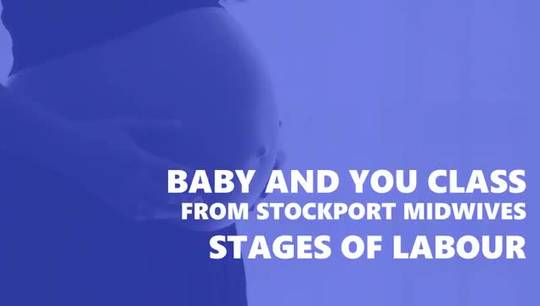Baby and You
Baby and You - Session 1- Preparing your Body for Birth
1,099 views
Transcript:
So now I want to tell you a little how you can prepare your body for birth. It is really important to think about your diet, particularly in the latter stages of pregnancy. Think about your iron count. Even if your iron count has been normal at 28 weeks, it’s still worth it to think about rich diets with lots of fruit and veg and lots of fibre. Fluids are also really important. Keeping yourself hydrated, particularly in the weeks leading up to the birth where hydration is going to be really important. There has actually been some benefit found in being hydrated and helping to prevent tears. We’ll talk a little about some of the trauma that may or not happen after the birth, but it’s just something to think about. Exercise is really important. I know you are probably struggling with that because you’re at home at the moment or just in your gardens so when the weather has been nice it’s been quite easy. There are lots of things out there, even online groups and things on Instagram or Facebook. As long as it is pregnancy related. You can even get in touch with the people running it to make sure it’s safe for you to do in pregnancy. Speak to your community midwife about it if you are unsure.
We recommend that you get a birthing ball for your pregnancy. It can be an exercise ball, something you’ve ordered online. Just make sure it’s not too small. It needs to be quite big and chunky and blown up so it’s firm. Make sure your hips are higher than your knees and then you’re not squatting down. That can really help with a lot of backache that will be associated as you get further into pregnancy. It straightens out your back and gives you a really good posture, so it really helps with backache. It helps with getting your baby into a good position for birth. Sam will go through that in a moment. So, think about a birthing ball and start to think about the positions you’ll adopt in your labour. I always recommend mums to start to practice their positions for the birth. We really promote an active and upright birth and we’ll talk about the reasons behind that shortly. Being upright is going to be really helpful to have gravity on your side. Start to think about how you might use the birthing ball. Perhaps hanging off the back of a dining chair, walking up and down stairs, think about the positions that you’re going to get in so that when you are in labour, it doesn’t feel so unusual. You also need to think about pelvic floor. The pelvic floor is a ring of muscles that goes around the vagina and the anus like a figure of 8 around both. That is the protecting canopy of muscles that helps to keep your baby in and well supported all the way through pregnancy. You will start to feel your pelvic floor more as your baby starts fixing down deeply into the pelvis. Sometimes women say that their pelvic floor is a little bit sore sometimes or uncomfortable, particularly if it’s not your first child. So, thinking about the pelvic floor and preparing it for labour and after the baby is born, you need to start to exercise it as it’s really important once you’ve had your baby to prevent urine incontinence and things like that which can sometimes happen even before your baby is born. The way you exercise your pelvic floor is holding in the muscles as tightly as you can and releasing them. I always recommend to my mums to pretend it's like a lift by tightening all of those muscles and taking it to the highest point you can and then slowly start to bring it down over 3 or 5 seconds of you can. It’s a bit like holding in wee. If you can’t do it or it feels uncomfortable, just tighten your pelvic floor as much as you can, take it up and hold it for a couple of seconds and then release it. You should be doing those a couple of times a day. Do it when the kettle is boiling or when you are brushing your teeth. You can even get apps such as the NHS squeezy app which is really helpful as it gives you an indication of when to do them. It’s also important to exercise your pelvic floor as way of getting in touch with the muscles that will have to soften and release in order for you to birth your baby naturally. It’s getting you to think about not only tightening up those muscles after the baby is born, but in labour actually releasing them. What we sometimes find as midwives is that at the end of the birth when you are about to push your baby out you can feel pressure in your rectum and vagina and it can be instinctive to tighten everything up and hold everything back when what we actually want you to do is release all those muscles and try and soften all of the muscles in your body in order for your body to take over and do what it needs to do in order to birth your baby. So as much as it’s important to know how to tighten the muscles, it’s also important to know how to release and soften them. One of the things you can consider in preparing for the birth is perennial massage. The perinea are the skin and muscle between the vagina and the anus. One of the things you can use is a base oil, or olive oil, or coconut oil, but make sure to do a 24-hour skin patch test first. You can put a little oil on your fingers and put your thumb into your vagina and press against the perinea towards your rectum. You will probably feel a tug or a sting and a pressure in that area and that’s what we want you to feel. If you are feeling that sort of sensation when you do perennial massage, then you are doing it right. It is helpful in getting the skin and muscle in that area to stretch and be ready for birth. We don’t recommend you do it until at least 36 or 37 weeks and every other evening would be fine. Some people feel very comfortable doing perennial massage and other people don’t want to do it and aren’t comfortable touching that area of their body and that’s okay. It’s personal preference. But what it’s also really good at is helping you to start to feel those sensations that you are going to feel when the baby’s head is being born. So that softening and stretching of the muscles, the burning and tingling sensation, won’t feel such a surprise and so foreign when you actually give birth to your baby because you will have already started to stretch out the muscles and skin in that area. So, a few things to think about in preparing your body which is really important.





